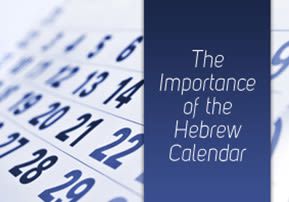
The Importance of the Hebrew Calendar
One's personal, inner process of self-rectification and outward involvement begins with and depends upon his use of the Jewish calendar for reckoning time...

Both the written and the oral Torah open with a distinct awareness of the significance of time. The written Torah begins with the words, "In the beginning, G-d created the heavens and the earth"; the oral Torah begins with the words, "From what time on may one recite the evening Shema?"
Moreover, the first commandment given to the Jews as a people, as they were about to leave Egypt, was the mitzvah to sanctify each new moon, which is the foundation of the Jewish calendar. From this we may understand that this ability to determine the proper reckoning of time, is in itself the Divine power we possess to leave Egypt (which signifies all states of spiritual bondage), even today.
When a Jew makes a point of reckoning time according to the Jewish calendar, he enhances his overall spiritual consciousness. The principles according to which Jewish time is determined are called "the secret of the ibbur," ibbur meaning both the "intercalation" of the leap month and "pregnancy." Living life according to the Jewish calendar "impregnates" the mind with higher states of Jewish consciousness. The word ibbur is also cognate to the word ivri, or "Hebrew."
(In the terminology of Kabbalah, "pregnancy" occurs when the insight of chochmah is posited in the "womb" of binah, where it develops into a full-fledged mental structure. From this pregnancy are subsequently born the concomitant emotions.)
Remarkably, the numerical value of the Hebrew words for "Hebrew date" (ta'arich ivri) is identical to that of the word for "In the beginning" (bereishit, 913). This is a clear allusion to the fact that both one's personal, inner process of self-rectification and his outward involvement with rectifying the world at large begins with and depends upon his use of the Jewish calendar for reckoning time.
After the primordial sin, G-d addressed Adam with the question: "Where are you?" One's personal assessment of where he is in life begins with determining where he is in the world, both physically and spiritually. In Kabbalah, it is explained that the dimension of time is what connects the dimension of space (one's physical location) and the dimension of soul (one's spiritual location). By first knowing what day today is, one can know and link his physical location with his spiritual location. (In Jewish law, as well, when witness are cross-examined in capital cases, most of the judge's questions revolve around the issue of when the crime took place.)
To be a Jew means first and foremost to think like a Jew. To think like a Jew means to assess life and make decisions from a Jewish point of view, beginning with how one schedules his affairs in his personal appointment book. Then, and only then, can one know "where" he is in life, and how he can succeed in bringing himself and his portion of the world to their proper and ultimate fulfillment.
(Reprinted with courtesy of www.inner.org)












Tell us what you think!
Thank you for your comment!
It will be published after approval by the Editor.